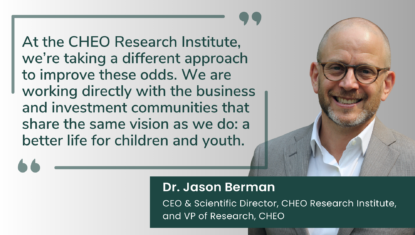06/02/2024
Ottawa, Ontario — Tuesday February 6, 2024

Canadian parents are concerned. The status quo of Canada’s pediatric healthcare system is simply not meeting the needs of families. Kids are often waiting too long for the care they need to live their best lives.
As a pediatric doctor, oncologist, researcher, and parent, I see it first-hand every day.
Canada’s health systems are struggling to meet the needs of a growing population of children and youth, especially in Ottawa where our young population is growing at nine times the provincial average.
New polling commissioned by Children’s Healthcare Canada reveals that 94% of Canadians agree that Canada’s healthcare system needs to be improved to better serve the needs of children and youth, with 57% strongly agreeing that urgent action is required.
At CHEO, we have a plan to grow and to ensure that we have the right space and people to provide the care our communities need. As we build and transform our space, we also need to transform how we deliver care.
In healthcare, we know that innovation is part of how we constantly improve outcomes of care. But healthcare as an industry has long suffered from its inability to adopt a growth mindset to take risks and work outside of the box to bring promising new technologies into the clinics, the emergency department, the operating rooms, and in-patient units.
In Canada, 10% of all start-ups are in med-tech. Of that number, 90% of these start-ups fail. So often, it is because start-ups aren’t connected early enough to the right people to understand the real problems facing clinicians and hospitals. Knowing how to navigate the complex, highly regulated healthcare system can be a barrier to bringing solutions through to implementation.
At the CHEO Research Institute, we’re taking a different approach to improve these odds. We are working directly with the business and investment communities that share the same vision as we do: a better life for children and youth.
While for any entrepreneur, this is a no-brainer, in healthcare, these relationships can get complicated. Healthcare is a long-beloved publicly funded service that has been part of the fabric of our nation for more than 60 years. And far too often, there are perceptions that innovation, competitiveness, commercialization, and public service can’t co-exist.
But we think it can. And it can be beneficial to everyone involved – especially patients. Already, we are working with Bruyère and local start-ups to support innovators and innovative ideas to find ways to solve the most pressing problems faced by health care organizations, clinicians, and researchers to help patients of all ages.
In early December, we hosted the inaugural National Health-Tech Innovation Conference to connect and brainstorm ways to do this effectively. We brought together representatives from healthcare, research and business communities to share and discuss the barriers and silos affecting the implementation of new ideas and the ways we can address them and set them on a journey to success.
One of our guests, Ashleigh Kennedy, Founder and CEO of Neurovine, shared her challenges as a small, start-up interacting with large, mainly bureaucratic health organizations. Start-ups don’t have a long runway and having someone on the “inside” to help champion and focus the health-tech solution is extremely helpful.
Our keynote speaker and a pioneer in health-tech innovation, Dr. Iain Hennessey, of Alder Hey Innovation in Liverpool, UK, didn’t hold back in sharing some his failures in addition to his successes. Embracing risk and learning from failures can fuel groundbreaking advancements and transform frontline challenges into innovative solutions.
Finally, Dr. Matthew Bromwich, pediatric ENT surgeon and Clinical Medical Director of the CHEO Research Institute Innovation Core, summarized it best by quoting famed inventor and businessman Charles Kettering: “A problem well stated is half solved” and challenged attendees to execute on the second half.
So where do we go from here? The road ahead is complex, long and, in some cases, unchartered. But there is no denying there are pressing problems facing healthcare today and we owe it to parents and families to address them.
Jason Berman is CEO and Scientific Director at the CHEO Research Institute and Vice-President of Research at CHEO.
